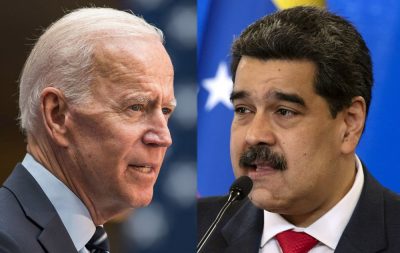Biden Will Likely Try to Politically Influence Venezuela by Re-engaging with It Economically

All Global Research articles including the E-Book can be read in 27 languages by activating the “Translate Website” drop down menu on the top banner of our home page (Desktop version).
***
Following its January 6 announcement, the European Union (EU) reaffirmed on Monday that it no longer recognizes Juan Guaidó as the interim president of Venezuela. In 2018, the EU claimed that Nicolás Maduro was not the legitimate president and backed Guaidó. After the EU, the U.S. could also end its recognition of the self-proclaimed interim president and change its sanctions policy with a new one that is more conducive to normalization. Washington will most likely try and strengthen American economic presence in the devastated Venezuelan economy and convert that into political influence.
Although the European Council believes that the December 6 parliamentary election in Venezuela was a “missed opportunity” for democracy because they were supposedly not in line with international standards for democratic processes, it was concluded that Guaidó remains a “privileged interlocutor” for the EU, but as an opposition figurehead and not interim president.
Guaidó remains the recognized interim president of Venezuela for only the United Kingdom and the U.S., but that could soon change. Guaidó’s political party did not go to the polls and could not measure the influence and popularity they have among Venezuelans because they were afraid that they would not receive the support they promised their Western partners they enjoyed.
Maduro’s political opposition lost control of the parliament in the recent election. The parliament was their political stronghold between 2015 and December 2020. Guaidó, who chaired the parliament, lost the formal basis that Western countries used to declare him as the interim president of Venezuela. January 5 marked two years since Guaidó declared himself interim president because the opposition did not recognize Maduro’s election as head of state. They claimed that the presidential election was rigged. At the time, self-proclaimed president Guaidó was immediately recognized by the U.S. as interim president, and then by the EU.
After Biden’s election to the U.S. presidency, Maduro immediately sent him congratulations, expressing hope that he would lift sanctions against Venezuela and start a new era in bilateral relations. The EU, under pressure from former U.S. President Donald Trump, followed a rigid policy against Venezuela, full of accusations, threats, sanctions and demands that he surrenders his presidency. But now a lot has changed. That is why neither the U.S. or the UK will continue recognizing Guaidó for long.
A few days after receiving a congratulations from Maduro, Biden diplomatically replied that he was ready to start a new policy and new negotiations with Venezuela. It is symptomatic that as soon as there was a new president in the White House, the Guaidó-aligned president of CITGO, an extremely rich and U.S.-based branch of Venezuela’s state oil company PDVSA, immediately resigned. This is an indication that Guaidó has come to an end.
It must be remembered that in the middle of last year, a court in London recognized Guaidó as the “acting president” of Venezuela and gave him access to Venezuela’s gold reserves stored in the Bank of England, which was followed by a lawsuit from Maduro’s legal team. At the end of October last year, the Court of Appeals in London concluded that the Court of First Instance did not assess the facts well and that Maduro exercised control over the government, which is why the case returned to the Court of First Instance for retrial. It is very likely that the British court will accept the fact that Guaidó no longer has a formal basis to dispose of such large gold reserves, which is very important for the functioning of Venezuela in these extremely difficult economic times caused by U.S. sanctions.
With the departure of Trump, who was the first to recognize Guaidó as interim president and constantly imposed sanctions against Venezuela, a lot has changed. Biden will try to achieve political power through economic influence in Venezuela. Because of the sanctions, not only did Venezuelan companies suffer, but also foreign companies that did business in the South American country. Because of that, about 50 large companies from the U.S. had to leave Venezuela, suffering major losses.
Biden no longer wants such a policy and announced that it is inadmissible to have bad relations with Latin America because it is too close to the U.S. It is likely that the new president will, first of all, try to win over countries with his economic policy, and then through economic influence, achieve political ones. If Biden follows this path, it will encourage American companies to invest in Venezuela again, and they will look to strengthen those ties. In this way, it will amortize the destructive policies made by Trump against Venezuela.
*
Note to readers: please click the share buttons above or below. Forward this article to your email lists. Crosspost on your blog site, internet forums. etc.
This article was originally published on InfoBrics.
Paul Antonopoulos is an independent geopolitical analyst.
Featured image is from InfoBrics

